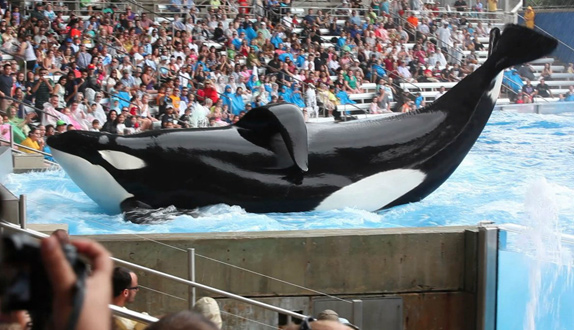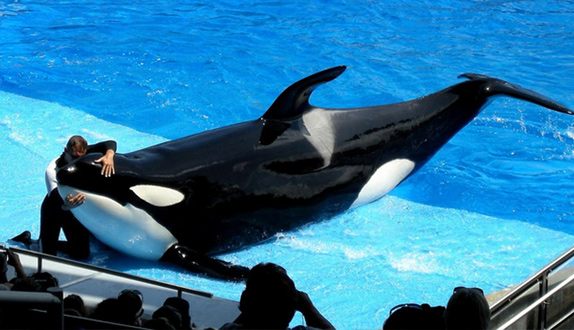Interview: ‘Blackfish’ director Gabriela Cowperthwaite

Tilikum is the biggest killer whale at SeaWorld in Orlando, Florida – the mighty star attraction of the marine park. He is also a killer, implicated in the deaths of three people. After orca trainer Dawn Brancheau died while working with Tilikum in 2010, Blackfish director Gabriela Cowperthwaite started investigating the relationship between trainers and the killer whales they love. What she uncovered was a chilling tale of death and misery that defies SeaWorld’s bubbly image. You can find more information about screenings and issues the film arises by visiting blackfishmovie.com.
Frances Morton talked to Cowperthwaite on the line from Los Angeles.
You took your kids to SeaWorld before making this film. Will you ever take them back again?
COWPERTHWAITE: I will not. Once I found out what I found out, I can no longer take my kids there in good conscience.
How much did you know about killer whales before making this film?
Very little. I knew that they were highly intelligent but I guess I never quite knew what highly intelligent meant. We just toss those terms around. I’ve since come to understand that everything that we have, they have in their brains. Yet they have another part of the brain that we don’t have and we can’t even identify.
At what point did you realise that you were uncovering a sort of serial killer-thriller?
I didn’t set out to make anything but a philosophical film about human beings and our animal counterparts. I think when I found out that Tilikum had killed twice before, that was a revelatory moment for me. It made me realise that I had to pull back the curtain and really delve full bore into what might be a controversial story. That’s not necessarily my nature in terms of my past filmmaking but I felt like I had no choice. Once you learn the truth your mandate is to tell it.
How did you find the key players and persuade them to talk – particularly the wonderful pirate type fellow who actually took young killer whales from the ocean?
He was a tremendous interview for me. I had learnt there was someone named John Crowe who had helped capture killer whales. But I was also told he was probably no longer alive. I called every John Crowe in Western Canada. Then every John Crowe in Washington and finally got to Oregon and tracked him down. It was old-fashioned cold calling. We drove 14 hours for a one-hour interview. I was so moved by how much was percolating right beneath the surface for him emotionally, even after decades.

SeaWorld refused to be interviewed for the documentary, have you heard from them since it came out?
No I haven’t. They issued a couple of statements in the press that the film fails to bring up the fact that they care very much about their trainers and their whales.
Yet the film shows the trainers clearly care but its perhaps misguided care and not in the best interest of the whales.
That’s where I would make the distinction between the trainers and the upper management. The trainers are there for the whales. They are the ones who love them, who care for them and put themselves at great risk on a daily basis for these whales. There is no question that the trainers care but upper management is clearly ruled by different forces. They’re there to uphold the business model – to the extent that healthy whales and safe people help that model they’re all for it. That model prevails. A $2 billion a year model.
Having animals in circuses is now widely considered barbaric, why do we still tolerate keeping marine animals in captivity or is a shift happening?
In order for us to imagine that intelligent animals in marine parks are being treated like circus animals we would really start viewing SeaWorld and Shamu stadium as a circus and thinking that’s what we’re patronising when we go there. These animals are working for their food. This is a circus model in a way. But in this country [the US] we have grown up with four decades of happy Shamu icon imagery. We thought the killer whales were overall probably pretty happy in marine parks. They are certainly well loved and we grew up thinking that these were great symbiotic relationships that trainers and killer whales have. In order to disabuse ourselves from that notion we have to force ourselves to see through the veneer.

Why not call the film Killer Whale, after all that’s what Tilikum is?
Right. In the film the old timer fisherman called them blackfish. And the First Nation people, the native Americans from the Pacific Northwest, also called them blackfish. It was an animal never to be captured and never to be harmed. For me it resonated deeply. I also wanted people to think they were not coming to their average animal activist movie. I wanted the film to speak to people who have never given these issues a single thought.
What change do you hope this film brings about?
I hope it is an agent of change. I hope it encourages SeaWorld to shift and evolve. I hope we are no longer passive consumers feeding into this fairy tale. In terms of things SeaWorld could do, they include a sea pen option where you portion off part of a cove with a net and semi release killer whales. They can’t eat live fish. A lot are on antibiotics and wouldn’t survive in open ocean so this is a way you can keep an eye on them and make sure their health is maintained. That’s where I would encourage SeaWorld to go. It could still be a profit driven model.
But that’s me and at some point I have to divorce myself from the film and it’s now everybody’s film. That happens with documentaries. Give your kid out to the world and hope he does ok. As a film, I hope that it opens your eyes. I trust audiences when they’re armed with the truth they will make the decision that’s best for them.
Who are some documentary makers you admire?
One thing that is neat about Capturing the Friedmans is it’s a tremendously powerful documentary but we both came into our films thinking we were making another film. Then we learn something and think, ‘Oh my gosh. Now we have to make the film that’s before us’. There’s one called The Rules of Engagement from a while back about the Waco incident. Crumb, I remember it blowing my mind when I watched it. I just saw one called The Act of Killing [also playing at the NZIFF] – it might be one of the most devastating and important films I’ve ever seen. It was so difficult but so, so important.
Read more about the film at the official Blackfish website.














